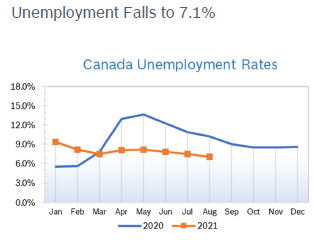Consumer Prices Rise 0.6% in July The Consumer Price Index (CPI) rose 3.7% on a year-over-year basis in July, up from a 3.1% gain in June, according to Statistics Canada. Excluding gasoline, the CPI increased 2.8% year over year. On a monthly basis, the CPI rose 0.6% in July, the fastest pace since January 2021. On a seasonally adjusted monthly basis, the CPI was up 0.5%. Prices rose for six of the eight components, with shelter prices contributing the most to the increase. Prices for new homes continue to be impacted by shifting consumer preferences as well as higher building costs compared with July 2020. Gasoline prices continued to rise, but at a slower pace. The BoC had earlier projected that inflation would rise to about 3% because of the disparate comparisons to 2020 but should return to close to the bank’s target of 2% by the end of the year. Statistics Canada is attempting to balance the impact of the pandemic by removing items that were not available in March from the year-over-year comparisons. GDP Expands 0.7% in June Real GDP expanded 0.7% in June following two consecutive monthly declines. Total economic activity was 1.5% below February 2020's pre-pandemic level. Overall, 15 of 20 industrial sectors were up as both services-producing (+0.7%) and goods-producing industries (+0.9%) rose. Retail trade rose 4.0% in June, partially offsetting the declines in April and May, as 8 of 12 subsectors rose in the month. Residential building construction was down 2.3% in June, decreasing for the second consecutive month after reaching a record high in April. The construction of all types of residential buildings fell, with single-family homes and doubles contributing the most to the decline. Repair construction decreased 0.9%. Nonresidential building construction decreased 1.1%, the third consecutive monthly decline, as lower commercial and industrial building and structure construction more than offset growth in institutional building construction. Q2 GDP Falls 1.1% Canada's economy unexpectedly shrank 1.1% in the second quarter on an annualized basis and most likely contracted 0.4% in July following a 0.7% gain in June, according to new data from Statistics Canada. Analysts had expected second-quarter annualized growth of 2.5%. Housing and Construction News Canada housing starts fell slightly in July to a seasonally adjusted annual rate of 272,176 units after falling to 282,070 units in June, according to Canada Mortgage and Housing Corp. (CMHC). Home sales fell 3.5% in July to 48,686 units after falling 8.4% in June, according to the Canadian Real Estate Association (CREA) and are down 28% from their peak in March. CREA noted that four consecutive months of dropping sales is an indication of continuing fatigue and frustration among buyers dealing with sky-high prices and a shortage of homes. Sales were down in 80% of all local markets. CREA found that the average price of a home sold dropped to $662,000 in July from $679,000 in June but was still up 15.6% from July 2020. Excluding the pricey Greater Toronto Area and Vancouver, the average price was $132,000 less. Retail Sales Rise 4.2% Retail sales rose 4.2% in June to $56.2 billion after falling to $53.8 billion in May. Sales restrictions were eased in many regions and sales were up in six provinces and 8 of 11 subsectors, representing 69.5% of retail trade. Core retail sales, which exclude gasoline stations and motor vehicle and parts dealers, increased 4.6%. In volume terms retail sales were up 4.1% in June. Retail sales declined 0.7% in the second quarter of 2021 after posting three consecutive increases. In volume terms, quarterly retail sales were down 0.9%. Decreasing for the third consecutive month, sales at building material and garden equipment and supplies dealers fell 3.1%. In June, 5.3% of retailers in this subsector reported being closed for at least one day. Retail Ecommerce Sales Fall in June On a seasonally adjusted basis, retail ecommerce sales fell 9.5% in June. On an unadjusted basis, retail ecommerce sales were up 6.3% year over year to $3.6 billion in June, accounting for 5.8% of total retail trade. With the increased ability to purchase non-essential items in stores, the share of ecommerce sales out of total retail sales fell 1.2% in June compared with May. Retail Notes Canadian Tire revenue rose 23.9% to $3.92 billion from a year ago, well ahead of expectations. Canadian Tire is beefing up their supply chain. They purchased a 25% stake in Ashcroft Terminal Ltd, with direct access to CP and CN rail mainlines. They made the $40-million investment in order to improve the flexibility of their supply chain, drive longer-term savings and lower carbon emissions, according to Canadian Tire CEO Greg Hicks. Hicks went on to say they left sales on the table in Q2 because of supply chain restrictions, although they leveraged relationships with vendors, transportation providers and third-party logistics facilities to get inventory to their dealers. Having deep inventory available has been one of the things fueling strong growth. Canadian Tire recently chartered three vessels with 2,000 containers each to transport goods, the first time they have ever chartered their own boats. Canadian Tire was chosen as Canada’s Most Respected General Merchandise Retailer in the first national study of the Canadian public’s opinions conducted by Maru Public Opinion Research, which surveyed more than 3,700 randomly selected Canadians in June 2021. © Robert Bosch Tool Corporation. All rights reserved, no copying or reproducing is permitted without prior written approval.
|
Archives
July 2024
|








